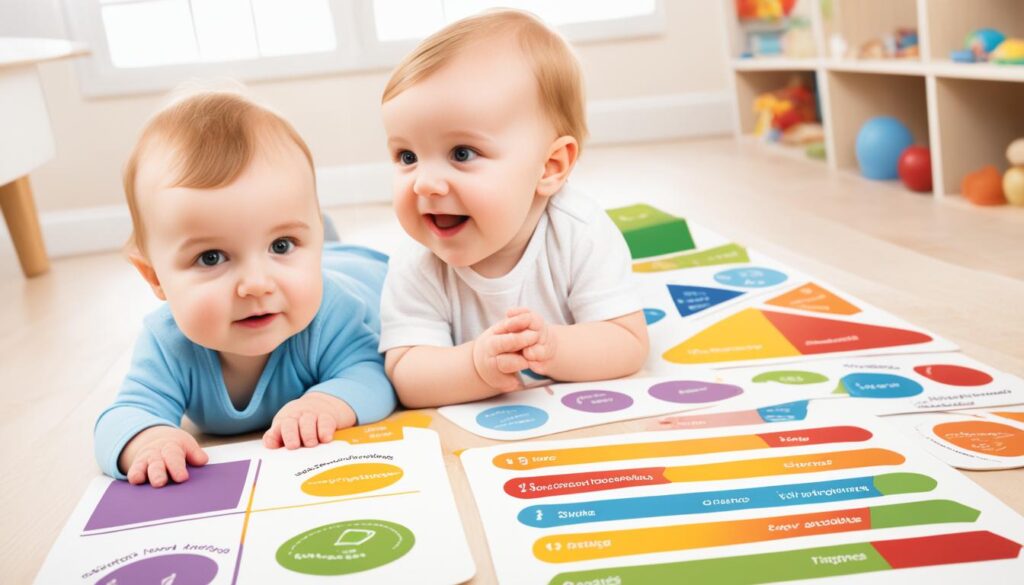Parenting Styles
2023 Indiana Parenting Time Guidelines Update
Explore the latest updates to Indiana parenting time guidelines 2023 ensuring fair custody agreements. Learn how they affect your family rights.

Thousands of folks in Indiana feel the impact of **custody agreements** every year, changing their daily routines and future. **The Indiana Supreme Court adopted the 2023 parenting guidelines** to give a better way to handle the complicated world of post-separation family life. These **guidelines** help steer through the tough roads of Indiana custody agreements, protecting family rights and ensuring everyone’s welfare.
Our understanding of these guidelines begins with the recognition that they are more than mere recommendations; they represent a collective commitment to a child’s right to maintain strong, healthy relationships with both parents, regardless of living arrangements. The guidelines act as a beacon, guiding us through the specific needs that each unique family scenario brings to the forefront. Notably, these updated provisions come to life with the understanding that only under rare circumstances, where the wellbeing and safety of a child are jeopardized, should they be set aside.
In weaving these guidelines into our judicial practices, primary considerations are given to the child’s perspective—ensuring that the dissolution of a shared household is not misconstrued as their burden to bear. Encouraging independent bonds with each parent, free from the shadow of conflict, is a cornerstone of these guidelines. In essence, the 2023 parenting guidelines are a testament to our evolving grasp of what it means to nurture the post-divorce family dynamic for the betterment of all parties, particularly the youngest ones, whose voices often echo the loudest in halls of family law.
Key Takeaways
- The Indiana Parenting Time Guidelines are designed to uphold the best interest of children during and after the dissolution of their parents’ shared household.
- These guidelines are a pivotal resource for developing Indiana custody agreements that are mindful of a child’s development and family dynamics.
- While the guidelines apply broadly, exceptions are made when a child’s health or safety could be at risk, demonstrating a commitment to family rights.
- They promote an environment for children that is free from conflict between parents, a critical component in their emotional development.
- The 2023 parenting guidelines reflect the recognition within family law of the importance of a child’s need for stable relationships and understanding post-separation.
Understanding the Updates to Indiana Parenting Time Guidelines
In our commitment to ensuring the well-being of children and the fairness of custody arrangements, Indiana Parenting Time Guidelines have undergone significant updates. These modifications align with ongoing societal shifts and leverage the advancements in digital communication, triggered largely by recent global challenges. These updates, incorporated since Jan 1, 2022, are essential for legal professionals and families navigating custody changes and family law updates.
The revised guidelines reflect a deep understanding of the dynamic nature of family relationships in contemporary society. By focusing on custody changes and incorporating broader communication methodologies, including digital platforms, the guidelines enhance interactions between parents and children, ensuring that the essence of family bonds is not eroded by physical distance.
- Integration of technology in communication.
- Adjustments owing to pandemic-related challenges.
- Regular revisions to match the evolving social structures.
These adjustments do not merely respond to temporary needs but are envisioned as enduring enhancements that will make the guidelines more adaptable to any future societal changes.
| Aspect | Pre-2022 Guidelines | Post-2022 Updates |
|---|---|---|
| Communication Technology | Limited digital communication guidelines | Extensive integration of digital platforms |
| Adaptability to Change | Infrequent updates | Commitment to regular reviews and updates |
| Contextual Custody Arrangements | Generic and rigid frameworks | Flexible and context-sensitive frameworks |
These updates not only make the Indiana Parenting Time Guidelines more relevant but also more practical, supportive of fair legal practices, and reflective of modern family law updates. It is essential for those affected to understand these changes thoroughly to navigate their legal rights and responsibilities effectively.
The Premise Behind the Indiana Parenting Time Guidelines 2023
At the core of the recent updates to the Indiana Parenting Time Guidelines is the recognition of the profound impact that parental involvement has on child development. The guidelines are meticulously crafted to enhance the quality and consistency of parental contact after separation, which is crucial for fostering psychological stability and growth in children.
A Child’s Development and Parental Contact
Our understanding is that a child’s development thrives on stability and consistent emotional support, which both parents are encouraged to provide post-separation. Parental involvement should adapt to the child’s evolving needs as they grow, ensuring that both parents play an active and complementary role, regardless of their domestic arrangements.
Adjusting to Separate Household Dynamics
Navigating the shift from a united to a divided household setup demands sensitivity to the child’s perspective, alleviating any stress that comes from living across two homes. It requires careful consideration to maintain routines that are as consistent as possible, thereby minimizing disruption in the child’s daily and emotional life.
The Role of the Domestic Relations Committee
The Domestic Relations Committee, an integral part of the guideline’s formulation, ensures that the guidelines not only reflect current legal standards but also embody the latest child development research. Their continuous assessment and revision of the guidelines play a crucial role in accommodating the dynamic nature of family structures and child welfare needs.

General Provisions and Their Impact on Parenting Plans
The general custody provisions of the Indiana Parenting Time Guidelines play a pivotal role in shaping effective and responsive Indiana parenting plans. These provisions are meticulously designed to uphold the core objectives of promoting responsible parenting and ensuring the child’s needs for safety, stability, financial support, and family connections are met. By addressing several crucial aspects of parenting logistics, these guidelines foster an environment of cooperation and mutual respect among separated or divorced parents.
Central to the general custody provisions is the emphasis on clear communication strategies. Such measures ensure that both parents are kept informed of the child’s needs and progress, which is essential for co-parenting arrangements to succeed. Furthermore, the guidelines stipulate protocols for introducing changes to scheduled parenting times, thus accommodating unpredicted shifts in parental responsibilities without compromising the child’s routine and comfort.
Implementing robust and comprehensive Indiana parenting plans requires adherence to general custody provisions. These guidelines are incredibly impactful, as they underwrite the structured yet flexible framework necessary to address emergent scenarios such as public health crises
To encapsulate the diverse aspects of these general custody provisions, let’s examine how they integrate into everyday parenting challenges:
- Communication: Ensuring ongoing and effective dialogue between parents.
- Schedule Adaptability: Facilitating adjustments in parenting time in response to unforeseen circumstances.
- Dispute Resolution: Providing mechanisms for resolving conflicts amicably and efficiently.
- Familial Engagement: Encouraging the cultivation of meaningful relationships with extended family members, pivotal for a child’s emotional development.
By aligning general custody provisions with the best interests of the child, the Indiana Parenting Time Guidelines offer a versatile yet comprehensive framework that significantly influences the development of resilient and adaptive Indiana parenting plans. These guidelines not only reinforce the legal framework but also promote a nurturing environment vital for the holistic development of the child post-separation or divorce.
Adapting to Technology: Communication Modifications in the New Guidelines
The integration of technology in our daily lives necessitates its inclusion in how we manage and approach remote communication, especially in delicate areas like child-parent relationships. The 2023 updates to the Indiana Parenting Time Guidelines aptly reflect this change, offering a robust framework for digital parenting that supports sustained connection between parents and their children even when they’re not physically together.
Methods of Remote Communication with Children
Under the new guidelines, a variety of platforms and tools are acknowledged to facilitate remote communication. Traditional phone calls remain foundational; however, the rise of digital platforms means emails, texts, and instant messaging apps are now normal channels for parents to maintain daily contact with their children. This shift not just accommodates the convenience factor but significantly aids in maintaining the richness of the child-parent relationship in a digital age. Each platform allows for private, uninterrupted exchanges, crucial for fostering a sense of closeness.
Protecting Child-Parent Relationships in the Digital Age
Protecting the sanctity of the child-parent relationship amidst the flood of digital influences is critical. The guidelines provide clear boundaries and expectations for digital parenting, ensuring that the virtual environment supports healthy relationships. It is emphasized that all remote communication should be direct and without surveillance by the other parent unless specifically agreed upon or stipulated for safety reasons. This ensures that children can share freely, nurturing trust and comfort in every interaction.
Technology’s ever-expanding role opens up unmatched opportunities for continuous relationship-building in scenarios where traditional face-to-face interactions might be challenging due to geographical or logistical reasons. These guidelines prepare parents to adeptly handle this aspect of modern parenting, ensuring that neither distance nor the digital medium dilutes the quality of parental engagement.
Shared Parenting Plans: A New Approach
At the heart of the revised Indiana Parenting Time Guidelines, the introduction of shared parenting marks a pivotal advancement. Contrasting with the static nature of parallel parenting, shared parenting fosters a dynamic, fluid interchange between both parents, enriching the family structure. This model not only supports mutual involvement but also encourages a nurturing environment conducive to better child upbringing.
Within family courts, the assessment of co-parenting plans relies heavily on several distinct factors. These include the parents’ ability to cooperate, their individual relationships with the child, and crucially, the child’s capacity to adapt to shared parenting arrangements. By focusing on these elements, the intention is clear: to cultivate strong emotional and developmental relationships between the child and each parent.
This cooperative approach promoted by the guidelines aims to transition family court perspectives from solely legal frameworks to more child-centric, emotional considerations.
| Key Component | Description | Impact on Child |
|---|---|---|
| Parents’ Cooperative Ability | Ability of parents to work together in raising the child despite separation. | Higher cooperation correlates with more stable emotional environment for the child. |
| Relationship Quality | Each parent’s relationship quality and attachment with the child. | Secure attachments promote better psychological outcomes in children. |
| Child’s Adaptability | The child’s resilience and openness to new living arrangements. | Greater adaptability can ease the transition and reduce stress. |
In essence, the evolution towards shared parenting within the updated guidelines highlights a conscious shift towards recognizing the nuanced realities of post-separation family dynamics. This model, applied thoughtfully through family courts and into co-parenting plans, embodies a comprehensive path to nurturing healthier, more resilient familial relationships post-divorce.
Importance of Parental Involvement and Flexibility
The Indiana Parenting Time Guidelines emphasize the importance of significant parental involvement and the development of flexible parenting plans to adapt to the unique needs of each family. Our goal is to support an environment where co-parenting dynamics thrive on mutual respect and constructive communication.
Creating a Positive Co-parenting Environment
To nurture a positive co-parenting dynamics, it is essential that both parents engage actively and consistently. This engagement helps in maintaining a stable and loving environment that enhances the overall well-being of the child. Constructive and respectful communication between parents is a cornerstone in this setup, directly affecting the child’s emotional and social development.
Individual Needs of the Child in Parenting Arrangements
Addressing the individual needs of the child is crucial in forming practical and flexible parenting plans. Each plan should consider the child’s age, temperament, and developmental requirements, ensuring they align with the lifestyle and schedule of both parents. This personalized approach ensures that every child receives the appropriate level of care and attention, despite the logistical challenges posed by separate households.
Through focused parental involvement, parents can foster a nurturant atmosphere that accommodates the distinct circumstances of their family life. Flexibility in these arrangements is not merely about adjusting times and dates; it’s about adapting to the child’s growing needs, unexpected life events and evolving emotional landscape.
In conclusion, the Indiana Parenting Time Guidelines are designed to accommodate the complexities of modern childcare in divorced or separated families by emphasizing the need for both robust parental involvement and adaptable, child-centric parenting plans. By doing so, they ensure that the child’s best interests are always at the forefront of co-parenting efforts.
Handling Unforeseen Circumstances and Public Health Emergencies
In navigating the complexities of modern parenting, the updated Indiana Parenting Time Guidelines address the need for custody adjustments in the wake of unforeseen circumstances and public health emergencies. We understand that maintaining stability in parenting arrangements is crucial, yet flexibility must be embedded to manage unexpected changes effectively.
Adjusting Parenting Time in Exceptional Situations
When unforeseen circumstances arise, such as sudden public health emergencies, the Indiana Parenting Time Guidelines provide a structured approach to facilitate necessary custody adjustments. These adaptations ensure that the child’s welfare remains a priority without compromising the equitable distribution of parenting responsibilities.
“Make-Up” Parenting Time: Guidelines on Involuntary Absences
Public health emergencies can disrupt scheduled parenting times. Under these guidelines, provisions are made to allow “make-up” parenting time. This ensures that both parents maintain meaningful relationships with their children, even if the original schedules cannot be adhered to due to uncontrollable circumstances.
| Scenario | Impact | Adjustment |
|---|---|---|
| Public Health Lockdown | Scheduled visitation interrupted | Virtual interactions & scheduled make-up dates |
| Transport Disruptions | Parent unable to reach child | Flexible re-scheduling once normalcy resumes |
| Unexpected Illness | Parent or child falls ill | Postponement and extension of previous plans |
These strategic adjustments are crucial for coping with the challenges posed by unforeseen circumstances and ensuring that the child’s best interests are safeguarded during public health emergencies.
Holiday Parenting Time Schedules and Updates
As we navigate the complexities of custody during holidays, it’s crucial to adhere to structured holiday parenting schedules that prioritize the well-being of our children. The recent updates to the Indiana Parenting Time Guidelines have introduced modifications designed to ensure that holiday time is evenly and fairly distributed, allowing both parents to maintain meaningful relationships with their children during these important periods.
These updates to the holiday parenting schedules are part of an ongoing effort to address evolving family dynamics and to ensure that our children experience continuous and meaningful contact with both parents, regardless of the season. Let’s explore how these schedules operate to harmonize the sharing of time, as well as the significant updates that have been included to cater to the specific needs of families during festive seasons.
| Holiday | Age Group | Parent A Time | Parent B Time |
|---|---|---|---|
| Christmas | 0-5 Years | Dec 24, 10 AM – Dec 25, 10 AM | Dec 25, 10 AM – Dec 26, 10 AM |
| Thanksgiving | 6-12 Years | Thanksgiving Day | Day after Thanksgiving |
| New Year’s | 13-18 Years | Dec 31, 5 PM – Jan 1, 2 PM | Jan 1, 2 PM – Jan 2, 2 PM |
Understanding and implementing these structured schedules help alleviate the stress associated with custody during holidays. By standardizing these schedules, we ensure clarity and prevent conflicts, allowing both parents and children to enjoy these special times with minimal disruption. Our commitment to continuously improving these guidelines signifies our dedication to fostering child-centered holiday arrangements.
Special Considerations for Infants, Toddlers, and Teenagers
In formulating the Indiana Parenting Time Guidelines, special attention is given to the unique developmental considerations at various stages of a child’s growth. Recognizing the distinct needs of infants, toddlers, and teenagers allows for adjustments that cater specifically to these crucial phases.
Guidelines Adapted for Different Developmental Stages
From the tender first months to the transformative teenage years, our guidelines for infants, toddlers, and teenagers are structured to ensure that parenting plans evolve with the child’s development. Each stage is met with tailored provisions that facilitate appropriate parental involvement and foster a nurturing environment.
Addressing the Changing Needs as Children Grow
As children grow, their emotional and developmental needs become increasingly complex. Our guidelines dynamically adapt to these changes by offering detailed schedules that take into account schooling, social activities, and the need for stable relationships with significant adults outside the immediate family.
For babies and young toddlers, the guidelines emphasize fostering secure attachments through consistent and predictable overnight parenting time. As children mature into the teenage years, the focus shifts to accommodating their more autonomous schedules while ensuring that parental bonds remain strong through regular, meaningful interactions.
By addressing these developmental milestones, the guidelines aim to create supportive environments conducive to healthy, emotional, and psychological growth. These measures ensure that each critical phase from infancy through to the teenage years is supported by thoughtful, well-structured parenting time guidelines.
Enhanced Accessibility and Clarity in the Indiana Parenting Time Guidelines
The Indiana Parenting Time Guidelines continually evolve to ensure that they provide accessible parenting guidelines that help both parents understand their roles and responsibilities clearly. The focus is on developing tools that assist in creating transparent family plans, thereby supporting the fundamental parental rights while taking into account the unique needs of families.
Facilitating Better Understanding Among Parents
One of the primary objectives of the latest updates is to make these guidelines more understandable. Our commitment is to simplify legal jargon so that every parent, regardless of their legal expertise, can comprehend their responsibilities and rights. This effort not only supports transparent family law but deeply impacts the effectiveness of parenting methods post-divorce or separation.
Increased Transparency in Parental Rights and Responsibilities
To fortify the idea of transparency, detailed commentaries accompany each section of the guidelines, helping parents grasp the implications of each rule and how it applies to their situation. By openly acknowledging and explaining the potential need for deviations, we cater directly to those seeking clarity on how unforeseen circumstances may affect their parenting approach.
In summary, our ongoing revisions of the Indiana Parenting Time Guidelines are geared towards creating a framework where parental rights are not only protected but are also easy to understand and apply. It is our belief that by enhancing guideline accessibility and facilitating better understanding among parents, we are building a foundation for more effective and cooperative parenting strategies.
Conclusion
As we delve into the intricacies of Indiana family law, it’s paramount to recognize the substantial advancements made by the 2023 updates to the Indiana Parenting Time Guidelines. These revisions have been meticulously crafted to bolster effective custody planning, foregrounding the child’s well-being amidst an ever-shifting family law landscape. The guidelines stand as a testament to the pursuit of constructive collaboration between parents, endorsing a paradigm where flexibility and responsible parenting are more than ideals–they are the foundation for modern co-parenting.
With the integration of digital communication tools, the new guidelines keenly adapt to the technological era, safeguarding child-parent connections regardless of physical distance. Concurrently, innovative shifts toward shared parenting underscore an enriched cooperative spirit, pivotal for nurturing the emotional health of children traversing their parents’ separation. In the throes of public health crises, the updated parameters for parenting time exhibit a resilient framework, capable of sustaining familial bonds through unforeseen adversities.
In essence, the parenting guidelines conclusion draws a clear line – one that connects the dots between judicious custody decisions and the holistic growth of children. Our collective goal remains unwavering: to harmonize the developmental requisites of children with the reality of their parents’ distinct scenarios. The latest guidelines recalibrate the scales of justice, promoting a fairer approach that aligns with the core values of Indiana’s custody agreements. It is a stride forward, ensuring that at the heart of each decision lies the best interest of the child, cemented within the robust edifice of family law.
FAQ
What are the 2023 Indiana Parenting Time Guidelines?
How do the new guidelines address technology in parenting?
What is the “Shared Parenting” model introduced in the updates?
Are there provisions for unexpected changes in parenting time due to emergencies?
How do the Indiana Parenting Time Guidelines cater to a child’s developmental stages?
What steps have been taken to make the Indiana Parenting Time Guidelines more accessible and clear?
How important is parental involvement and flexibility in the new Indiana Parenting Time Guidelines?
Do the updates address holiday parenting time?
How do the amendments to the guidelines impact family court decisions?
What is the role of the Domestic Relations Committee in updating these guidelines?
Parenting Styles
Gentle Guidance: Authoritative Parenting Vs Gentle Parenting
Key differences emerge between gentle parenting and authoritative parenting, but which approach will guide your child towards emotional intelligence and well-being?

Considering ways to **raise kids**? You’re likely pondering **authoritative parenting**, a blend of warmth and firmness, and **gentle parenting**, which stresses empathy and understanding. Both prioritize clear boundaries, meeting children’s needs, and **positive reinforcement**. Authoritative parenting might use time-outs and grounding, whereas gentle parenting focuses on understanding feelings and motivations. Discovering these styles reveals effective discipline techniques, strong relationships, and ways to boost **emotional intelligence**. **Dive deeper** into each approach, and you’ll uncover a friendly guidance style that fits your family just right.
Key Takeaways
• Both gentle parenting and authoritative parenting prioritize setting clear boundaries and rules for children's safety and accountability.
• Gentle parenting focuses on understanding children's emotions and motivations, whereas authoritative parenting uses methods like time-outs and grounding for discipline.
• Both styles emphasize open communication, empathy, and emotional support to foster healthy relationships and emotional intelligence in children.
• Authoritative parenting balances warmth and strictness, while gentle parenting prioritizes empathy and responsiveness to children's needs.
• Both parenting styles aim to develop emotional intelligence in children, but gentle parenting takes a more collaborative approach to discipline and guidance.
Understanding Gentle Parenting
As you explore the world of gentle parenting, you'll discover an approach that prioritizes empathy, respect, and understanding children's emotions and behaviors. This parenting style focuses on creating a strong emotional connection with your child, acknowledging their feelings, and setting boundaries while maintaining a nurturing atmosphere.
Gentle parenting is about understanding your child's emotions and behaviors, rather than simply disciplining them. By doing so, you'll help your child develop self-regulation skills, becoming more capable of managing their emotions and behaviors independently.
In gentle parenting, empathy and respect are the cornerstones. You'll work to understand your child's perspective, validating their emotions, and guiding them to make better choices. This approach encourages you to model the behavior you want to see in your child, communicating calmly and avoiding rewards or punishments.
Authoritative Parenting Explained

You'll find that authoritative parenting combines clear boundaries with emotional responsiveness, establishing a delicate balance between guiding your child's behavior and nurturing their autonomy. This parenting style sets clear rules and expectations while being responsive to a child's needs, allowing for open communication, reasoning, and negotiation within established boundaries.
As an authoritative parent, you'll use positive reinforcement, consequences, and discussions to guide your child's behavior.
Here are some key aspects of authoritative parenting:
- Clear rules and boundaries: Establishing clear expectations and consequences helps your child understand what's expected of them.
- Responsive parenting: Being emotionally responsive to your child's needs helps them feel heard and understood.
- Positive reinforcement: Using positive reinforcement encourages good behavior and self-discipline.
- Open communication: Encouraging open communication helps your child develop problem-solving skills and independence.
- Balancing warmth and strictness: Authoritative parenting strikes a balance between being warm and nurturing, while also setting clear boundaries and expectations.
Combining Gentle Guidance

As you explore the combination of gentle guidance and authoritative parenting, you'll discover that setting clear boundaries, teaching emotional regulation, and modeling desired behavior are key components of this approach.
By focusing on these essential points, you'll be better equipped to provide your child with a sense of security and structure while also promoting emotional intelligence and independence.
Setting Clear Boundaries
By combining gentle guidance with authoritative parenting, you establish clear boundaries that provide structure and security for your child while still being attuned to their emotions and needs. This approach allows you to set firm boundaries without sacrificing empathy and understanding.
Effective boundary setting involves communicating expectations clearly and consistently to children, ensuring they understand what's expected of them.
When combining authoritative and gentle parenting, boundaries are set with respect for the child's emotions and needs in mind. This approach provides a sense of security and structure, helping children feel safe and secure.
Here are some key aspects of setting clear boundaries:
- Establishing non-negotiable rules while maintaining empathy and understanding
- Communicating expectations clearly and consistently to children
- Providing structure and security for children through firm boundaries
- Respecting the child's emotions and needs when setting boundaries
- Demonstrating consistent communication and consistent consequences for misbehavior
Teaching Emotional Regulation
Teaching children to regulate their emotions is essential for their emotional well-being, and combining authoritative and gentle parenting provides an effective approach to achieving this goal.
By adopting a gentle guidance approach, you can help your child develop emotional regulation skills, which are vital for their overall development. This involves understanding the emotional needs behind their behavior, rather than just correcting it.
As a parent, you play a significant role in modeling healthy emotional regulation for your child. By combining authoritative parenting's firm boundaries with gentle parenting's empathetic guidance, you can create a nurturing environment that fosters resilience.
This approach enables children to learn how to identify and manage their emotions effectively, leading to better emotional regulation. By providing gentle guidance, you can help your child develop the skills they need to navigate complex emotional situations, ultimately leading to improved emotional well-being.
Modeling Desired Behavior
You model desired behavior for your child when you demonstrate empathy, respect, and understanding in your daily interactions. As a parent, you play a significant role in shaping your child's behavior, and gentle guidance is essential in this process.
By combining gentle parenting with authoritative parenting, you can create a balanced approach that fosters positive behavior in your child.
Here are some key aspects of modeling desired behavior:
- Demonstrate empathy: Show your child that you understand and care about their feelings.
- Practice active listening: Listen attentively to your child and respond thoughtfully.
- Use clear communication: Communicate clearly and respectfully with your child.
- Show respect: Treat your child with respect and kindness, even in difficult situations.
- Model positive behavior: Demonstrate positive behavior yourself, such as honesty, kindness, and responsibility.
Effective Discipline Methods

As you explore the world of effective discipline methods, you'll find that setting clear boundaries is vital in both authoritative and gentle parenting approaches.
By establishing a clear understanding of what's expected, you can encourage positive behavior and minimize the need for punishment.
When it comes to redirection over punishment, gentle parenting takes the lead, focusing on guiding your child towards better choices rather than imposing consequences.
Setting Clear Boundaries
Establishing clear boundaries is essential in both authoritative and gentle parenting, as it helps children develop self-regulation skills and understand the consequences of their actions. As a parent, you're likely wondering which approach is most effective. The truth is, both authoritative and gentle parenting styles prioritize setting clear boundaries, but they differ in their methods.
Here are some key differences:
- Authoritative parenting involves setting boundaries through positive discipline methods, such as time-outs and grounding, while emphasizing emotional connection.
- Gentle parenting focuses on understanding the child's emotions and motivations behind their behavior, setting boundaries with empathy and respect.
- Both styles aim to establish clear guidelines for behavior while prioritizing emotional connection.
- Effective discipline methods in authoritative parenting may include consequences and discussions, while gentle parenting emphasizes empathy and respect.
- The key difference lies in how boundaries are enforced: authoritative parenting is more rule-based, while gentle parenting focuses on emotional attunement.
Redirection Over Punishment
By shifting the focus from punishment to redirection, you can create a more positive and constructive discipline approach that encourages good behavior. Redirection is a key aspect of gentle parenting, focusing on guiding children towards positive behavior rather than punitive measures. This approach helps children learn appropriate behavior by offering alternatives and addressing the root cause of misbehavior.
Authoritative Parenting:
- Uses redirection along with clear explanations of expectations and consequences
Gentle Parenting:
- Emphasizes understanding the child's perspective and guiding them towards better choices through redirection
Both Parenting Styles:
- Prioritizes teaching and guiding children through redirection rather than relying solely on punishment
- Focuses on addressing the root cause of misbehavior rather than just the behavior itself
- Encourages positive behavior through guidance and teaching, rather than punishment
Navigating Parent-Child Relationships

When maneuvering through the complexities of parent-child relationships, you'll need to strike a delicate balance between setting clear boundaries and providing emotional support. Both authoritative and gentle parenting approaches prioritize building strong relationships based on trust and communication.
To navigate these relationships effectively, consider the following key aspects:
- Set clear boundaries: Establishing clear expectations helps children feel safe and secure, while also teaching them responsibility and accountability.
- Practice empathy: Show your child that you understand and acknowledge their emotions, helping them develop emotional intelligence and self-awareness.
- Foster open communication: Encourage your child to express their thoughts and feelings, and actively listen to their concerns.
- Provide emotional support: Offer comfort and reassurance when your child is struggling, helping them develop resilience and coping skills.
- Cultivate trust: Be consistent, reliable, and follow through on commitments, building a foundation of trust that strengthens your parent-child relationship.
Raising Emotionally Intelligent Children

You can help your child develop emotional intelligence by adopting an authoritative or gentle parenting approach, both of which prioritize empathy and open communication. These parenting styles focus on raising emotionally intelligent children who can regulate their emotions and communicate effectively.
As a parent, you can choose a parenting style that suits you and your child's needs. Authoritative parenting sets clear expectations and rules while being responsive to a child's emotions, using positive reinforcement to encourage good behavior. On the other hand, gentle parenting emphasizes empathy, understanding, and allowing feelings to guide discipline, avoiding rewards and punishments.
Both approaches aim to raise emotionally intelligent children who can understand and manage their emotions. When it comes to discipline, authoritative parenting uses consequences, whereas gentle parenting focuses on understanding and teaching. By adopting either approach, you can help your child develop emotional intelligence, which is vital for their social, emotional, and academic success.
Frequently Asked Questions
Are Gentle Parenting and Authoritative Parenting the Same Thing?
As you explore parenting styles, you may wonder: are gentle parenting and authoritative parenting the same thing? While they share similarities, they're not identical.
Both emphasize warmth, empathy, and clear communication, but gentle parenting prioritizes emotional attunement slightly more. Authoritative parenting sets clear rules and expectations while being responsive to emotional needs.
While they differ in nuance, both styles aim to create a supportive environment for children to thrive.
What Are the 4 Parenting Styles?
You might be surprised to know that 75% of parents don't identify with a specific parenting style, but understanding the four main styles is essential.
You're likely familiar with authoritarian and permissive parenting, but there are two more: authoritative and uninvolved.
Authoritative parents balance warmth and structure, promoting independence.
Uninvolved parents, on the other hand, are neglectful and detached.
Recognizing these styles helps you identify your approach and make informed decisions about your parenting strategy.
What Is the Most Effective Parenting Style?
You're likely wondering what the most effective parenting style is. Research suggests that a blend of gentle guidance and authoritative parenting yields the best outcomes for children's emotional and behavioral development.
This balanced approach combines emotional attunement with clear boundaries and positive reinforcement, promoting emotional regulation and resilience in kids. By incorporating elements of both styles, you can foster a healthier, more supportive relationship with your child.
What's the Opposite of Gentle Parenting?
As you explore the world of parenting styles, you may wonder, what's the opposite of gentle parenting?
Well, the antithesis of gentle parenting is often considered authoritarian or harsh parenting styles. These approaches prioritize strict rules, punishments, and obedience over empathy and understanding.
In contrast to gentle parenting's emphasis on emotional connection, harsh discipline, and rigid control characterize the opposite approach, which may prioritize obedience through fear or coercion.
Is Gentle Parenting a Middle Ground Between Authoritative and Permissive Parenting?
Gentle parenting is often seen as the middle ground between authoritative vs permissive parenting. It sets clear boundaries like authoritative parenting but focuses on empathy and understanding, much like permissive parenting. By combining aspects of both styles, gentle parenting aims to create a balanced and nurturing approach to raising children.
Conclusion
As you navigate the complexities of parenting, you're faced with two distinct approaches: authoritative parenting, which emphasizes structure and boundaries, and gentle parenting, which prioritizes empathy and understanding.
While they may seem like opposing forces, combining gentle guidance with authoritative discipline methods can foster emotionally intelligent children who thrive in a balanced environment.
By embracing this harmonious blend, you'll raise children who are confident, resilient, and equipped to navigate life's challenges.
Parenting Styles
Firm yet Nurturing: Authoritative Parenting Vs Authoritarian
Striking a balance between discipline and empathy, discover the transformative power of authoritative parenting in shaping your child's future.

Thinking about a balance of being firm and loving? **Authoritative parenting** blends warmth, open talk, and clear rules. This way helps kids become independent, self-reliant, and successful. On the flip side, **Authoritarian parenting** with its strict rules and punishments can stifle creativity, decision-making, and social skills. By choosing the authoritative approach, expect your kid’s self-esteem, grades, and social talents to flourish. Understanding these styles can guide you to make smart choices, shaping your kid’s bright future.
Key Takeaways
• Authoritative parenting balances warmth, responsiveness, and clear rules, promoting independence, self-esteem, and social skills in children.
• Authoritarian parenting, on the other hand, prioritizes obedience and control, potentially leading to anxiety, low self-esteem, and aggression in children.
• Authoritative parents empower children to develop self-reliance, whereas authoritarian parents stifle independence and decision-making skills.
• Clear boundaries and open communication are hallmarks of authoritative parenting, fostering a sense of security and structure in children.
• By combining warmth and firmness, authoritative parents promote positive outcomes, such as better academic achievement and higher self-esteem in children.
Understanding Authoritarian Parenting
In authoritarian households, you're often met with a strict, no-nonsense atmosphere where obedience is demanded, and free thinking is discouraged. Here, strict rules govern every aspect of life, and children are expected to comply without question. This parenting style prioritizes control and authority over warmth and flexibility, leading to an environment that stifles creativity and independence.
As a result, children under authoritarian parenting may lack decision-making experience, as they're not encouraged to think for themselves. This can lead to rebellion, as children may feel suffocated by the lack of autonomy. Additionally, they may struggle with social skills, having been discouraged from expressing their thoughts and opinions.
The emphasis on obedience over understanding can create a power struggle, where children are more likely to rebel against the strict rules rather than internalize them. By understanding the characteristics of authoritarian parenting, you can better appreciate the importance of a balanced approach that fosters both discipline and autonomy.
The Power of Authoritative Parenting

As you explore the power of authoritative parenting, you'll discover the significance of nurturing independence early on and fostering open communication with your child.
By doing so, you'll create an environment that encourages self-reliance, curiosity, and emotional intelligence.
Nurturing Independence Early
Essentially, by setting clear expectations and boundaries while maintaining a warm and supportive relationship with you, authoritative parents empower their children to develop a sense of independence from a young age. This nurturing independence early on is a hallmark of the authoritative parenting style, which prioritizes fostering self-reliance, curiosity, and self-control in children.
By explaining rules and listening to your viewpoint, authoritative parents encourage autonomy within limits, helping you develop a sense of responsibility and confidence in decision-making. Through consistent guidance and positive reinforcement, they create an environment that promotes self-reliance and autonomy. This approach helps you become more cooperative, cheerful, and achievement-oriented, setting the stage for a lifetime of personal growth and development.
Encouraging Open Communication
How do you create an environment where your child feels heard and understood, while still maintaining the authority and boundaries necessary for their development? Through authoritative parenting, you can foster open communication, which is essential for healthy development.
By listening to your child's viewpoint and validating their feelings, you create a positive relationship built on trust and respect. This approach encourages cooperative and cheerful behavior, as well as self-control and curiosity.
When explaining rules and consequences, you prioritize understanding your child's perspective, leading to a stronger bond and more effective communication. By doing so, you promote healthy development and self-reliance.
Authoritative parenting isn't about being permissive; it's about finding a balance between nurturing and setting boundaries. By embracing open communication, you empower your child to develop essential life skills, such as self-control and problem-solving, while maintaining a positive and loving relationship.
Parenting Styles and Child Outcomes

As you explore the effects of parenting styles on child development, you'll notice that the way you parent profoundly impacts your child's life.
For instance, research shows that authoritative parenting is linked to better academic achievement rates, while authoritarian parenting can negatively affect child development factors such as self-esteem and social skills.
Child Development Factors
Research has consistently shown that the parenting style you experienced in childhood greatly influences your social and emotional development, shaping the person you become.
As you grew up, your parents' approach to discipline, communication, and nurturing played a significant role in molding your personality, emotional intelligence, and social skills.
Authoritative parents tend to foster positive child outcomes, such as higher self-esteem, better social skills, and stronger emotional intelligence. On the other hand, authoritarian parents are linked to negative outcomes, including decreased self-esteem, anxiety, and aggression.
The emphasis on clear communication, reasonable expectations, and warmth in authoritative parenting leads to better decision-making skills in adulthood. In contrast, authoritarian parenting can hinder your ability to develop emotional intelligence and make informed choices.
The parenting style you experienced in childhood has a profound impact on your social and emotional development, influencing the person you become.
Academic Achievement Rates
Your academic success is closely tied to the parenting style you experienced, with authoritative parents giving you a significant edge in academic achievement rates. Research suggests that children raised with authoritative parenting styles show higher academic achievement rates compared to those raised with authoritarian styles.
This is because authoritative parents provide a balance of support and expectations, fostering a positive learning environment for their children. In contrast, authoritarian parenting, focusing on control and obedience, may hinder a child's academic success due to lack of autonomy and critical thinking skills.
As a result, children under authoritative parenting have better problem-solving skills and motivation to excel academically. The emphasis on communication, encouragement, and fostering independence in children also contributes to better academic outcomes.
Baumrind's Four Parenting Styles Explained

Diana Baumrind's groundbreaking work has identified four distinct parenting styles, each with its unique approach to raising children. As a parent, understanding these styles can help you identify your own approach and make informed decisions about how to meet your children's needs.
| Parenting Style | Description | Characteristics |
|---|---|---|
| Authoritative | Warm, responsive, and communicative | Clear rules, boundaries, and explanations |
| Authoritarian | Strict, punitive, and obedience-focused | Rules without explanation, punishment |
| Permissive | Warm, indulgent, and lenient | Lack of discipline, structure |
| Neglectful | Detached, uninvolved, and unresponsive | Minimal involvement, neglect |
You may recognize yourself or your own parents in one of these styles. Authoritative parenting, for instance, balances warmth and responsiveness with clear rules and boundaries, fostering a nurturing relationship. Authoritarian parenting, on the other hand, prioritizes obedience and punishment, often at the expense of children's emotional needs. By understanding these styles, you can reflect on your own approach and make intentional choices about how to raise your children.
The Impact of Parenting on Children

When reflecting on your parenting style, it's vital to contemplate the profound impact it has on your children's emotional well-being and social development. The way you parent can shape your child's self-esteem, academic performance, and social skills.
Authoritative parenting, characterized by warmth, reasoning, and clear rules, fosters positive outcomes in children. On the other hand, authoritarian parenting, marked by strict rules and punishment, may lead to decreased self-esteem, anxiety, and aggression in children.
The impact of parenting styles on children's development can have long-lasting effects on their emotional well-being and social interactions throughout life. As a parent, it's crucial to recognize the influence your parenting style has on your child's development.
Nurturing Vs Controlling Parenting

As you examine your parenting approach, you'll likely find that it falls into one of two categories: nurturing or controlling, with the former fostering a sense of safety and trust, and the latter often leading to resentment and rebellion.
Nurturing parenting, characteristic of authoritative parenting, prioritizes empathy and understanding, setting firm boundaries while considering your child's emotions. In contrast, controlling parenting, often seen in authoritarian parenting, focuses on strict rules and obedience, disregarding your child's emotional needs.
The key difference lies in the balance between setting boundaries and fostering a connection with your child. Authoritative parents achieve this balance, promoting self-reliance, friendliness, and achievement-orientation. Conversely, authoritarian parents prioritize control, leading to potential resentment and rebellion.
As you reflect on your parenting style, consider whether you're striking a balance between nurturing and setting boundaries, or leaning towards controlling and strict rules. By adopting a nurturing approach, you can foster a stronger, more trusting relationship with your child.
Effective Discipline Techniques

You'll find that effective discipline in authoritative parenting involves a thoughtful approach, where you set clear expectations, explain the reasoning behind rules, and enforce boundaries with empathy.
This approach is rooted in positive discipline, which focuses on teaching and guiding children, rather than simply exerting control.
By setting clear rules and consequences, you provide a sense of security and structure for your child. However, you also take the time to listen to their viewpoint and explain the reasoning behind the rules, promoting understanding and empathy.
This approach encourages obedience not through fear or punishment, but through a genuine understanding of the importance of boundaries.
In contrast to authoritarian parenting, which prioritizes control and obedience, authoritative parenting seeks to foster self-regulation and positive social interactions in children.
Parenting Style and Child Personality

Your parenting style has a profound impact on your child's emerging personality, shaping their behavior, attitudes, and relationships.
The way you parent can influence your child's personality, with authoritative parenting fostering cooperative, cheerful, and self-reliant children. On the other hand, authoritarian parenting may lead to obedient children who lack decision-making skills, warmth, and social competence.
Children raised with authoritative parenting tend to be achievement-oriented, curious, and friendly, whereas those from authoritarian backgrounds may exhibit anxiety, low self-esteem, and aggression.
The firm yet nurturing approach of authoritative parenting promotes self-control, curiosity, and positive social skills in children.
As a parent, your style can either empower your child or hinder their development. By adopting an authoritative approach, you can help your child develop into a confident, curious, and socially competent individual.
Types of Parenting Styles Defined

Understanding the distinctions between authoritarian and authoritative parenting styles is vital, as it can greatly influence your child's development and well-being. As a parent, it's important to recognize the differences between these two approaches to make sure you're providing the best possible environment for your child to thrive.
| Authoritarian Parenting | Authoritative Parenting |
|---|---|
| Emphasizes strict rules and control | Focuses on connection, warmth, and clear expectations |
| Uses phrases like 'Because I said so' | Validates child's feelings before setting boundaries |
| Prioritizes obedience over understanding | Prioritizes understanding and communication |
| Can lead to decreased self-esteem and anxiety | Fosters independence, self-regulation, and confidence |
Authoritarian parents often prioritize strict rules and consequences, whereas authoritative parents focus on setting clear expectations while validating their child's feelings. By understanding these distinctions, you can adopt a parenting style that promotes healthy development, self-esteem, and a strong parent-child relationship. By recognizing the differences between authoritarian and authoritative parenting, you can create a nurturing environment that fosters growth, confidence, and independence.
Raising Confident and Capable Kids

As you aim to raise confident and capable kids, you're likely wondering what approaches can help them develop inner strength and foster independence.
By adopting authoritative parenting, you'll create an environment that encourages self-reliance and decision-making skills, ultimately leading to more confident and capable individuals.
Building Inner Strength
By adopting authoritative parenting, you help your child develop inner strength, an essential quality that enables them to navigate life's challenges with confidence and resilience. This parenting style provides a balance of warmth and firm boundaries, allowing children to feel safe and supported while learning to make decisions and take responsibility for their actions.
As a result, children raised with authoritative parenting are more likely to develop confidence, independence, and problem-solving skills. They learn to navigate challenges, setbacks, and successes, building resilience and self-assurance. By validating their feelings and setting clear expectations, you help your child build inner strength, enabling them to tackle obstacles with confidence and poise.
This, in turn, fosters a sense of independence, as children learn to rely on themselves and their abilities. By adopting authoritative parenting, you're giving your child the tools they need to succeed in life, and that's a gift that will last a lifetime.
Fostering Independence
In fostering independence, authoritative parents empower their kids to become confident and capable individuals by gradually transferring responsibility and encouraging autonomy. This approach differs greatly from authoritarian parenting, which prioritizes control and obedience over nurturing guidance and support. By setting clear expectations and providing support, authoritative parents create an environment that fosters independence.
Here are some ways they do it:
- Encouraging decision-making: Authoritative parents give their kids the freedom to make choices, taking calculated risks, and learning from their mistakes.
- Gradual responsibility transfer: They gradually transfer responsibility to their kids, teaching them to take care of themselves and their belongings.
- Supporting autonomy: Authoritative parents provide emotional support and guidance, helping their kids develop problem-solving skills and self-reliance.
- Fostering self-regulation: They help their kids develop self-awareness, self-control, and self-motivation, essential for independence and confidence.
Frequently Asked Questions
How Does Authoritative Parenting Differ From Authoritarian Parenting?
As you explore the world of parenting styles, you'll notice that authoritative and authoritarian approaches differ considerably. Authoritative parents balance warmth and structure, validating children's feelings before setting boundaries, whereas authoritarian parents prioritize strict rules and punishment.
You'll find that authoritative parents use age-appropriate tools and consequences to teach and guide, fostering a strong parent-child bond and promoting independence, decision-making skills, and a sense of responsibility.
Are Authoritarian Parents Nurturing?
You may think authoritarian parents are nurturing, but that's not entirely true. While they may show some care, their primary focus is on control and obedience, not emotional support.
They prioritize discipline over warmth, often struggling to provide the emotional support and understanding that's essential for children's healthy development. In reality, authoritarian parents lack the nurturing aspect, prioritizing strict rules and punishment over connection and responsiveness.
What Is a Firm yet Responsive Parenting Style?
Imagine yourself as a parent, setting clear boundaries while maintaining a warm and supportive tone. This is what a firm yet responsive parenting style looks like.
You establish rules and expectations, but also prioritize open communication and understanding. By doing so, you provide guidance and structure while considering your child's feelings and perspective.
This balanced approach helps your child develop self-discipline, independence, and positive social skills.
What Are the 4 Types of Parenting Styles?
You might be wondering what types of parenting styles exist.
In essence, there are four main categories: authoritative, authoritarian, permissive, and neglectful.
Each style has distinct characteristics, such as varying levels of parental responsiveness and demands.
Understanding these styles can help you identify which approach works best for you and your child.
What are the key differences between authoritative and authoritarian parenting styles?
When it comes to parenting spectrum styles, the key differences between authoritative and authoritarian styles are clear. Authoritative parents are nurturing and responsive, while setting clear boundaries. Authoritarian parents, on the other hand, are rigid and demanding, with little room for flexibility or negotiation. The impact on children can be significant.
Conclusion
As you consider the complexities of parenting styles, you may wonder, 'But won't authoritative parenting be too permissive, leading to spoiled children?' Not necessarily.
By setting clear boundaries while maintaining a nurturing tone, authoritative parents can raise confident and capable kids. Research confirms that this approach yields better outcomes, including increased self-esteem and social competence.
By embracing authoritative parenting, you can foster a healthy, productive relationship with your child.
Parenting Styles
The Parenting Divide: Authoritarian Vs Permissive Essay
Witness the profound impact of parenting styles on children's emotional well-being and development, and discover the balanced approach that strikes the perfect chord.

Exploring how to **raise kids**, two main methods stand out: **strict** and **lenient**. Strict parents stick to rules and expect respect. Lenient parents go for freedom and talking things through. These approaches strongly shape a kid’s **self-worth**, **confidence**, and **social skills**. Understanding each style is key to making smart choices. By seeing the pros and cons, aiming for a mix that boosts emotional health, independence, and duty can shape a child’s future.
Key Takeaways
• Authoritarian parenting prioritizes discipline and control, leading to potential disconnection and rebellion in children.
• Permissive parenting emphasizes freedom and autonomy, but may result in uncertainty and self-doubt in children.
• The parenting approach significantly impacts children's emotional well-being, self-esteem, and confidence.
• A balanced parenting style, combining elements of authoritarian and permissive approaches, fosters independence, respect, and responsibility.
• Recognizing the long-term effects of parenting styles enables informed decisions that promote emotional and behavioral outcomes in children.
Authoritarian Parenting Style Defined
When you're raised by authoritarian parents, you're likely to grow up in an environment where strict rules and high expectations of obedience are the norm, with little room for flexibility or negotiation. This authoritarian parenting style is characterized by a focus on discipline and control, often at the expense of emotional support and warmth.
Your parents prioritize obedience and respect for authority figures, emphasizing rule observance without much explanation or room for negotiation. You're expected to follow the rules without question, and any disobedience is met with punishment or discipline. This style of parenting can lead to a sense of disconnection and rebellion in children, as they feel their autonomy is being stifled.
The lack of warmth and emotional support can also hinder social competence, making it difficult for you to form healthy relationships outside the home. Overall, the authoritarian parenting style is centered around discipline, control, and respect for authority, often at the cost of emotional well-being.
Permissive Parenting Style Characteristics

In stark contrast to authoritarian parenting, permissive parents take a hands-off approach, giving you the freedom to make your own decisions with minimal guidance or correction.
This permissive parenting style allows you to explore and learn from your own experiences, with minimal involvement from your parents in decision-making and goal setting. Permissive parents often prioritize casual communication, encouraging open dialogue without strict enforcement of manners or rules.
However, this approach can sometimes lead to uncertainty and low self-esteem in children, as they may lack clear boundaries and guidance. When it comes to administering punishments, permissive parents often struggle with consistency, which can confuse children and undermine their sense of responsibility.
Children raised in permissive households may benefit from the freedom to explore, but they may also struggle with uncertainty and self-doubt. Overall, permissive parenting styles prioritize autonomy and freedom, but may require careful balance to make sure children receive the guidance they need to thrive.
Impact on Children's Emotional Well-being
Both authoritarian and permissive parenting styles can have a profound impact on your emotional well-being, shaping your self-esteem, confidence, and overall emotional stability.
As a child, you may feel disconnected from your parents if they adopt an authoritarian approach, leading to poor emotional well-being. The lack of emotional support and communication in authoritarian parenting can contribute to emotional challenges.
On the other hand, permissive parenting can result in uncertainty about your actions, affecting your self-esteem and emotional stability. The absence of structure and guidance in permissive parenting can make it difficult for you to develop a sense of self-worth.
As a result, you may struggle with emotional well-being, confidence, and self-esteem. It's essential for parents to strike a balance between providing guidance and allowing autonomy, fostering open communication, and offering emotional support to promote healthy emotional well-being in children.
Long-term Effects on Child Development

As you navigate the complexities of parenting, it's vital to ponder the long-term effects of authoritarian and permissive parenting styles on your child's development, shaping their social skills, self-esteem, and overall well-being.
The authoritarian approach may lead to children experiencing depression, lacking social competence, and struggling with low self-esteem. On the other hand, permissive parenting can result in children with strong social skills, but may also contribute to unhappiness and poor academic performance.
In the long run, authoritarian parenting may instill obedience and respect for authority, but may also lead to children feeling disconnected from their parents and struggling with poor emotional well-being. Permissive parenting, on the other hand, may result in children feeling unsure of their actions, having low self-esteem, and lacking discipline.
It's crucial to understand that these parenting styles have a profound impact on your child's development, influencing their academic performance, emotional well-being, and social competence. By recognizing the long-term effects of authoritarian and permissive parenting, you can make informed decisions to shape your child's future.
Finding a Balanced Parenting Approach

By adopting a balanced parenting approach, you can create a nurturing environment that fosters independence, respect, and responsibility in your child. This approach strikes a balance between the authoritarian and permissive styles, combining the benefits of both.
By setting clear rules and allowing flexibility for growth, you can create an environment that promotes emotional and behavioral outcomes. A balanced approach considers both discipline and nurturing, ensuring your child develops into a well-rounded individual.
Unlike authoritarian parenting, which can lead to rebellion, or permissive parenting, which can lead to entitlement, a balanced approach instills respect and responsibility in children. By finding a middle ground, you can promote healthy development, encouraging independence while maintaining a nurturing environment.
This approach acknowledges that children need guidance and boundaries, but also requires adaptability and empathy. By adopting a balanced approach, you can create a harmonious environment that supports your child's growth and development.
Frequently Asked Questions
What Is the Difference Between Authoritarian and Permissive Parenting?
You're likely wondering what sets authoritarian and permissive parenting apart.
The key difference lies in their approaches to discipline and nurturing. Authoritarian parents prioritize obedience, setting strict rules and expectations, while being less emotionally responsive.
Permissive parents, on the other hand, take a more lenient stance, focusing on emotional connection and allowing children more freedom.
These distinct approaches shape children's development, influencing their social skills, self-esteem, and academic performance.
Why Do You Think Children of Permissive Parents Are Less Independent Than Those From Authoritative Families?
As the old adage goes, 'give them an inch, and they'll take a mile.'
You might find that children of permissive parents struggle with independence because they're not given clear boundaries or expectations. Without guidance, they may lack the skills to make decisions and take initiative.
In contrast, authoritative parents provide structure and support, allowing their children to develop autonomy and self-reliance.
How Do the Roles of Parents and Children Compare in Authoritarian and Permissive Families?
As you explore the roles of parents and children in authoritarian and permissive families, you'll notice distinct differences.
In authoritarian families, parents hold all the power, making decisions without input from children, whereas in permissive families, children are given more autonomy and freedom in decision-making processes.
This contrast is reflected in the parent-child dynamic, with authoritarian parents enforcing strict rules and permissive parents allowing exploration and learning through trial and error.
What Are the Arguments Against Authoritarian Parenting?
As you explore the world of parenting, you'll find that authoritarian parenting isn't without its drawbacks. On one hand, it provides structure and discipline, but on the other, it can lead to fearful, anxious, and dependent children. Critics argue that this approach can result in lower self-esteem, poor mental health, and strained relationships.
What are the key differences between Authoritative and Permissive parenting styles?
When it comes to parenting styles, the key differences between Authoritative and Permissive parenting styles are evident in the level of control and warmth. Authoritative parenting balances high expectations with responsiveness, while Permissive parenting is characterized by low demands and high responsiveness. In a parenting styles comparison: authoritative vs authoritarian, it’s clear that the former promotes independence while the latter can lead to rebellion.
Conclusion
As you navigate the complexities of parenting, finding a balance between authoritarian and permissive styles is essential. By doing so, you'll foster a fragile fusion of freedom and framework, allowing your child to flourish.
Flexible firmness, rather than rigid rules, will guide them toward a future filled with fortitude and flexibility. By adopting a balanced approach, you'll cultivate a canvas of calm, curiosity, and creativity, empowering your child to craft a life of confidence and character.
-

 Parenting Styles1 week ago
Parenting Styles1 week agoWorst Parenting Style: Impact on Child Development
-

 Vetted7 days ago
Vetted7 days ago15 Best Books on Step Parenting Every Blended Family Needs to Read
-

 Parenting Tips6 days ago
Parenting Tips6 days agoUnequal Responsibilities: When One Parent Does All the Parenting
-

 Parenting Tips1 week ago
Parenting Tips1 week agoFostering Love: How Much Do You Get Paid for Foster Parenting?
-

 Vetted6 days ago
Vetted6 days ago15 Best Parenting Books of All Time Every Parent Should Read
-

 Vetted19 hours ago
Vetted19 hours ago15 Best Co-Parenting Books Every Parent Should Read for Successful Co-Parenting
-

 Vetted6 days ago
Vetted6 days ago15 Best Books for Gentle Parenting Every Parent Should Read
-

 Parenting Tips6 days ago
Parenting Tips6 days agoCo-Parenting Challenges: Can You Block the Other Parent?



















